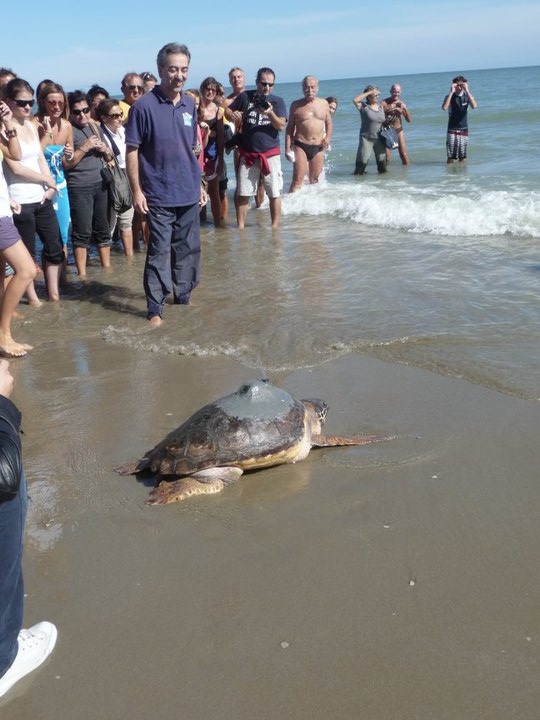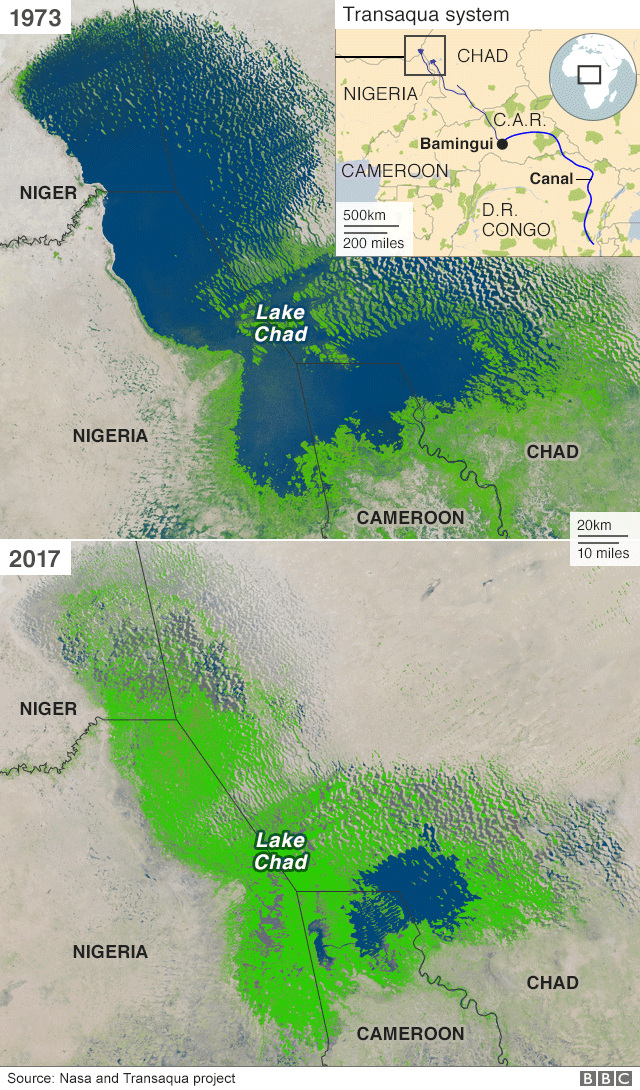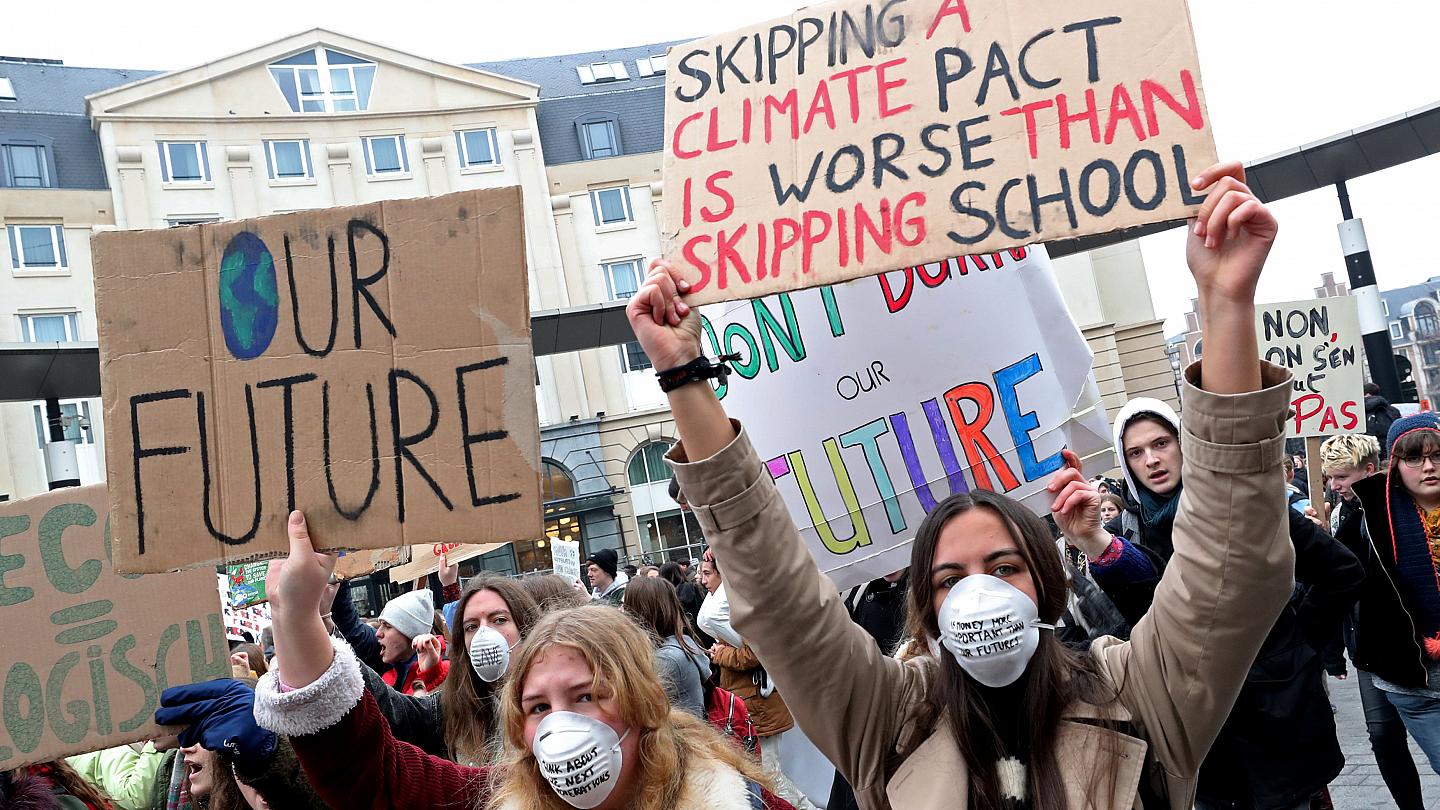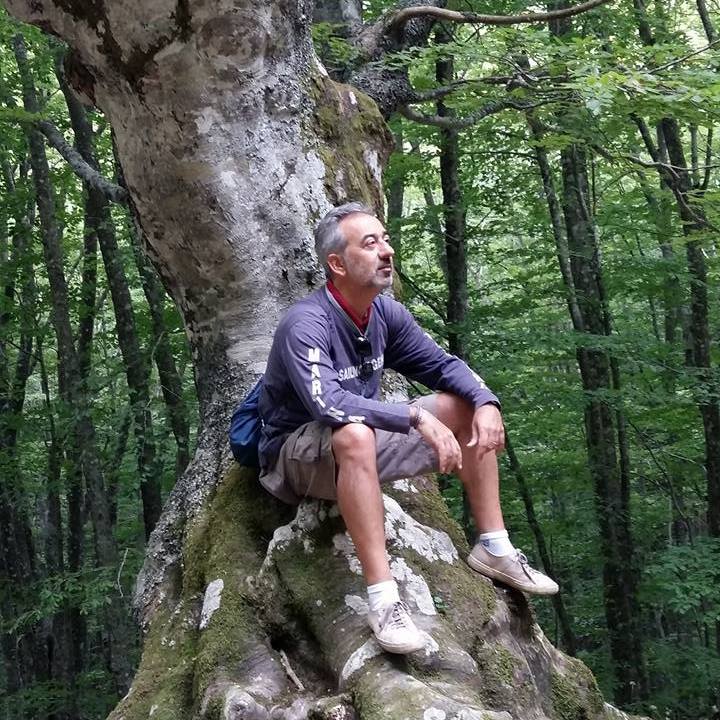Adults keep saying we owe it to the young people, to give them hope. But I don’t want your hope, I don’t want you to be hopeful. I want you to panic. I want you to feel the fear I feel every day. And then I want you to act. I want you to act as if you were in a crisis. I want you to act as if the house was on fire. Because it is. – Greta Thunberg, 16 years old – Special Address, Annual Meeting of the World Economic Forum 2019
My love and passion for nature, in particular for cetaceans, sea turtles and oceans in general brought me to meet Marco Affronte, roughly 15 years ago. It was mid-July and the sea turtle rescue center called Fondazione Cetacea Onlus, in Riccione, Italy was packed with children and adults alike. Marco was explaining the biology of these ancient endangered marine reptiles and the threats they were exposed to in the wild, most of which, are related to homo sapiens. Threats that bring too many of them to rescue centers, to be cured for release back into oceans only to find themselves facing the same dangers time and time again. Marco’s purpose and work to end climate change, global warming and thus save species on the brink of extinction, led him to the European Parliament where he is trying to turn effective environmental laws and policies into political action. I thought it would be interesting to write about some of his views on a few matters.

In a recent tweet President Trump confused cold weather conditions with climate change. Could you please explain the difference?
President Trump does not understand the difference between weather and climate. Weather refers to the state of the atmosphere in a given location and time with respect to calm or storm, clearness, cloudiness, heat, cold, rain or dryness. Climate refers to a prevailing set of environmental conditions which characterize regions of the earth over periods of time, years, in relation to temperature and precipitation. In this sense trends show that globally temperatures are rising constantly, thus the terms global warming and climate change. Now I don’t know if President Trump does not understand these concepts, probably not. However, he may be choosing to deny climate change to favor his idea of economic expansion and unlimited economic growth. By doing so he is trying to keep things the way they are in order to be able to continue along his way.
What type of impact is global warming having on Third World economies? Is there a relation between Global Warming and immigration in our era?
The impact is huge and on different levels. Since we are already fully experiencing the consequences of climate change (floods, hurricanes, desertification, drought) it is not difficult to imagine how these catastrophes literally destroy poorer countries and areas of the earth that do not have the economic resources to lift themselves up, rebuild and find new stability. The problem worsens if we consider the original dilemma: climate change. This is where it ties to immigration. Areas such as the sub-Sahara for example are deeply affected by global warming because their natural and economic resources are already limited and poverty is rampant. Climate change depletes all resources and poses people in the condition of having to move in order to survive. Sometimes it is sufficient to move from one region of the country to another. Other times people are forced to leave their homeland. Let’s not forget that climate change and global warming are also responsible for armed conflicts, power struggles and wars. Where resources are scarce people will begin to fight over the leftovers. A perfect example of this is what’s happened around Lake Chad. In sub-Saharan area the effects of climate change are easier to see, because they affect an already poverty stricken region of the world. Nonetheless, this does not mean that climate change is not affecting other parts of the planet. The Mediterranean basin for example, especially Italy, is considered a ‘hot spot’ for climate change and the consequences are becoming progressively more and more dramatic.

How is Global Warming affecting the fishing industry around the world? What is the situation in the Mediterranean?
This is a very interesting question. I will answer by using the words of a number of scientists I spoke with just a few months ago about this particular aspect of the effects of climate change. We know there are repercussions on the fishing industry but at the moment we cannot draw definite conclusions. For example, in the entire area of the Mediterranean, fish species that were typical of the southern area of the basin move north because water temperatures have risen and conditions are more favorable to them. There are also fish migrating from the tropical sphere of the Atlantic that pass through the Strait of Gibraltar or species that come from the Red Sea and pass through the Suez Canal. At one time these tropical fish died once they reached the Mediterranean. Today, they thrive in the Mediterranean because it has become very similar to their native marine habitat. The presence of tropical fish species in the Mediterranean changes the ecosystem. Such changes create an imbalance with regard to how and what man is normally used to fishing. The fish with commercial value tend to disappear or move to other areas. It is therefore evident that climate change does produce an effect on the fishing industry. It also shows how such effects are destined to grow and worsen in time. Having said this we must also consider what is known to be climate change’s “bad twin”; ocean acidification . Scientists are very concerned about this because the consequences of ocean acidification are unpredictable and potentially extremely dramatic.
In your opinion, are country leaders and governments doing enough to stop Global Warming?
Unfortunately, I don’t think they are. Scientists have said that we must stay below a two degree rise in temperature from now until the end of the century. If possible it would be better to stay below a 1.5 degree rise. At the moment temperatures have already risen by one degree. This leaves us with very little margin. We already have a prevision for future global warming trends. It tells us that if we continue with the BAU model (Business as usual), temperatures will most likely rise by four or five degrees. This could make our planet incompatible with life for human beings on earth as we know it. It does not mean we are going to disappear, however, society, our lives will be turned upside down. Obviously we must do all that is necessary to avoid such a scenario. The problem is that current environmental policies are insufficient to reach the goal which has been set by the scientific community. If governments do not adjust such policies we will most likely see a rise in global temperatures between 2.7/2.5 and 3.1/3.2 degrees. There are a few countries who are working hard to contrast climate change. The European Union, China and India are fully aware of the problem, but as we all know the USA withdrew from the Paris Agreement on climate change mitigation. Another concern related to politics is the fact that although laws and policies are drawn on paper with the best intentions, they come into conflict with economic interests and powers. When this happens, all the good will any single country may have becomes less effective because important issues and topics get diluted, or cut out of the programs. Many politicians reason according to what I call the “yes, but” logic. For example, if you ask them: “Are we going to fight climate change?” , they will answer: “Yes, but we can’t stop economic growth, employment…” All these “yes, buts” make for weak legislation. Let’s not forget the time factor, it plays a decisive role in easing the effects of rising temperatures. The slower we are on a political level, the less time we will have to dull the problem.
What if we can’t fix Global Warming? What’s going to happen to our planet and to us?
This question frightens me, because I have three children and my greatest concern is for their lives and their future. If we continue along this path, I believe things will become really awful from 2030 on, roughly ten years from now. So, what will we be facing? In the first place, natural disasters such as hurricanes, tornadoes, floods, drought in certain areas…events we are already witnessing, will largely increase and worsen, bringing a wide range of problematic consequences. Will human beings be able to adapt to the changes? An example could be if we think of agriculture and the natural cycle of seasons that is necessary to grow certain crops and food. As I mentioned before ocean acidification is a huge problem, just like ice melting is because it causes sea levels to rise. We also must consider the possibility of unexpected, sudden but not far fetched events to occur tied to rising sea levels. The Gulf Coast “will take a massive hit” , scientists warn and the thawing of Arctic permafrost , things like these are giving us very serious reason to worry.

The last question is inevitable. The internet is full of advice related to what each one of us should be doing on a daily basis, in and out of our homes, to stop Global Warming. Is there something more we should do, something we are not doing that needs to be done?
The problem with the list of things we should all be doing to stop global warming is that in order for all those good practices to be effective we would all have to abide by them in a consistent manner, and this is not always possible. Not that we should not try, we should always do our part to the best of our possibilities. However, we need to take the next step. Global warming must necessarily be confronted on a political and institutional level. Given this, there are two or three things we should consider doing. One is to learn how to recognize politicians whom are sensitive to the issue and vote for them regardless of the political party they represent. On the Italian political agenda, for example, climate change is not a priority, just like land use is not, not to mention risks tied to biodiversity and extinction. Another thing we can all do is engage in activism, be active in order to pressure governments to take serious measures to stop global warming. I was so happy to see students all over Europe, young people, who realize their own futures are at stake, fill city squares to promote an initiative they called Green Friday. About two weeks ago 35,000 students filled the streets of Brussels. This is truly encouraging and motivating. I hope this wave of protest among students continues, I don’t care if they loose a day of school, because governments, politicians need to deeply recognize they are ruining our children’s lives, and nobody has the right to do so. The well-being of future generations must be our priority. When I talk about these things at home, with my own children, my eighteen year old daughter Ilaria says: “Your generation made the mess and we’re left to clean it up. Really nice Dad.” It’s hard to answer that.


